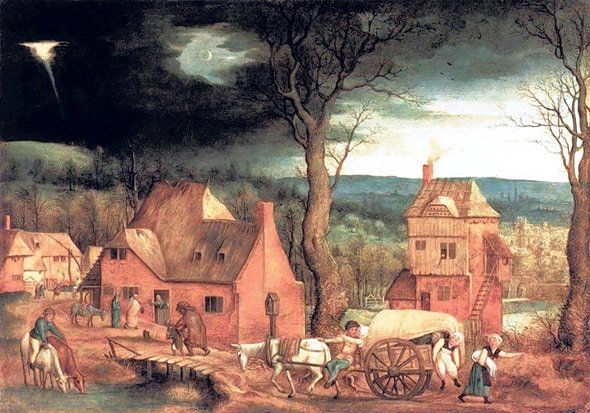It was lunchtime in college. A friend suggested we nip into town for a quick burger. Arriving at the fast food outlet, we found the queue extended from counter to door. Had we joined it, we would have been late for our afternoon lecture. ‘No room at the inn’, said my friend, ‘we’ll try somewhere else’.

Most today still realise that ‘no room at the inn’ comes from the Christmas story. The expression originates from Luke’s account of the birth of Christ. Luke 2:7 reads: ‘And she [Mary] brought forth her firstborn son, and wrapped him in swaddling cloths, and laid him in a manger, because there was no room for them in the inn’.
Bethlehem
Luke 2:7 is the only verse in the Bible indicating that the Lord Jesus was born in an animal shelter with feeding troughs. Early tradition says he was born in a cave used for sheltering animals.
The Church of the Nativity in Bethlehem, built on the supposed site of Christ’s birth, contains a cave or grotto to mark the site of this momentous event.
Why was the Lord of glory born in an animal shelter? The Scripture clues are sparse. Bethlehem was crowded with visitors, for Caesar’s decree had ordered people to return to their place of ancestral origin for official government registration. Accommodation in Bethlehem was at a premium.
The guest rooms at the town’s inn were full; or perhaps the inn keeper (who is not actually mentioned in Scripture) had qualms about giving hospitality to a woman soon to give birth.
Either way, Mary and Joseph had no choice but to spend the night in the covered shelter provided for animals. Amazingly it was there — amidst mute beasts and perhaps animal work-hands — that the Son of God, the longed-for Messiah was born.
For Mary, this was no doubt both physically distressing and socially humiliating. It was no modern maternity ward, yet the Bible tells us that it was there that Christ was born. Mary ‘brought forth her first born Son’.
Reality
Who would ever have thought that the Son of God would have been born in that way? Christ’s birth in an animal shelter just could not have been invented by human imagination: ‘Lo! Within a manger lies, he who built the starry skies’.
It shows that the Christian faith is based on history, not mythology; we are dealing with reality, not fantasy. Our calendars prove the reality of Christ’s birth every day, for we are living in the 21st century AD (after the birth of our Lord).
As Peter wrote some years later, ‘We did not follow cunningly devised fables when we made known to you the power and coming of our Lord Jesus Christ’ (2 Peter 1:16).
In 2 Corinthians 8:9 we read, ‘For you know the grace of our Lord Jesus Christ, that though he was rich, yet for your sake he became poor, that you through his poverty might become rich’.
Theologians divide Christ’s life into two states — humiliation and exaltation. His birth in the ‘cattle shed’ belongs to the first category. That there was ‘no room in the inn’ for Jesus tallies with Isaiah’s ancient prophecy that, ‘He is despised and rejected by men’ (Isaiah 53:3). Christ was rejected at his birth and then throughout his life.
His rejection culminated in being nailed to a plank of wood and hung up to die, and then for three hours being forsaken by God the Father himself. Yet his rejection accomplished our reconciliation. His forsakenness wrought our forgiveness.
It was not accidental. It was all part of God’s eternal plan to save a people for himself and for his glory. In Jesus, God became man — ‘the Word became flesh and dwelt among us’ (John 1:14).
Love
The Son of God became a son of man that the sons of men might become the sons of God. He was born that we might be born again. He was born to die, so that dying sinners might have eternal life.
The incarnation of Christ as man is a vital link in the chain of salvation history. The gospel proclaims, ‘For God so loved the world that he gave his only begotten Son, that whoever believes in him should not perish but have everlasting life’ (John 3:16).
The glory of Christ’s birth stems from the fact that he was born to be our Saviour. ‘There is born to you this day in the city of David a Saviour, who is Christ the Lord’ (Luke 2:10): a Saviour from sin, God’s wrath and eternal hell.
No room at the inn! The glory of Christ’s birth is not immediately evident to the eye, but well known to the eye of faith. Laid in a manger, because there was no room for them in the inn. The question for you this Christmas is: ‘Have you any room for Jesus?’
Thou didst leave Thy throne
And Thy kingly crown
When Thou camest to earth for me
But in Bethlehem’s home
Was found no room
For Thy holy nativity
O come to my heart Lord Jesus!
There is room in my heart for Thee.
(Emily Elliot, 1836-97)







